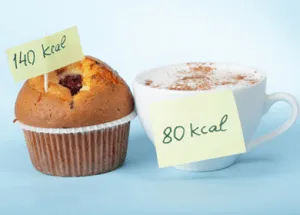Many of us grew up hearing how important it is to count calories if we want to lose weight or maintain a healthy diet. However, recent research has revealed that it may not be all that important to count calories, but more important to consider fat content instead.

Recent trends have promoted extremely low calorie diets as a method to lose weight and increase longevity. However, closer examination of this approach to food has shown that it has very little effect on long term weight loss, nor does it promote long life.
In reality, humans need calories for survival. Approximately 20 percent of calories from food is dedicated to brain function. The remainder is applied to muscle movements, circulation and respiration. In other words, the fewer calories a person consumes, the fewer resources their body has available for healthy functioning. The USDA recommended daily amount of calories ranges from approximately 2,000 to 2,500.
Fat is Necessary
In a study conducted in the United Kingdom, researchers found that although industrialized nations are eating fewer calories today than in the 1970s, obesity levels continue to rise at epidemic levels. This may, in large part, be attributed to the foods that many people in industrialized countries are eating.
Highly processed, easy to digest and consume foods contribute to weight gain and obesity. In simple terms, smooth texture foods take fewer calories to digest and can increase weight gain. As a result, they are the most fattening calories to eat. Consumers may think they are eating a healthy low calorie microwave or fast food dinner, when in fact they are adding to their weight gain dilemma. Simply put, a 250 calorie TV dinner is still less healthy than a 250 calorie meal composed of fruits vegetables and lean protein, even though they have the same calories.
In a study conducted at Boston Children’s Hospital New Balance Foundation Obesity Prevention Center, researchers compared three different diet styles – extremely low fat, extremely low carbohydrate and low glycemic index. The study found that study participants on the low fat diet had increased cholesterol levels, raising the risk of cardiovascular disease. Participants on the low carb diet had increased levels of cortisol and other markers for diabetes and cardiovascular disease. Participants on the low glycemic index diet demonstrated no negative effects on blood fat levels or hormone levels. Additionally, they burned higher amounts of calories simply based on food consumption.
The best approach to weight loss and maintaining healthy body weight levels is to eat a balanced diet of a wide variety of organic fruits, vegetables, nuts, seeds and whole grains (if you are not wheat intolerant). Eating lean proteins from a variety of sources also contributes to healthy weight levels. Eating foods that have complex textures is a good indicator of digestibility and the amount of energy it takes to digest the food. Consuming probiotics through kefir and yogurt as they add to the “good bacteria” in your gut, are a few of the exceptions here. By paying attention and being conscious of what you put in your mouth, you can avoid the calorie counting dilemma.
If you want to count something, count the ingredients in your food. More often than not, the more ingredients, the worse they are for you.
Have you stopped counting calories? What do you look for at your local market or grocery store?
– The Alternative Daily
